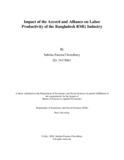| dc.contributor.advisor | Rahman, Dr. Shahidur | |
| dc.contributor.author | Chowdhury, Sabrina Fatema | |
| dc.date.accessioned | 2021-07-07T05:40:24Z | |
| dc.date.available | 2021-07-07T05:40:24Z | |
| dc.date.copyright | 2020 | |
| dc.date.issued | 2020-07 | |
| dc.identifier.other | ID: 19175001 | |
| dc.identifier.uri | http://hdl.handle.net/10361/14748 | |
| dc.description | This thesis is submitted in partial fulfillment of the requirements for the degree of Master of Science in Applied Economics, 2020. | en_US |
| dc.description | Cataloged from PDF version of thesis. | |
| dc.description | Includes bibliographical references (pages 71-82). | |
| dc.description.abstract | The year 2013 saw one of the most tragic accidents in the readymade garment (RMG) industry,
the Rana Plaza accident, which claimed more than 1100 lives of garment workers. This accident
drew attention of the world to the failures in ensuring safety in the workplace. In an attempt to
make sure such an accident does not occur in future, two transnational governance initiatives
were introduced; “Accord on fire and building and safety in Bangladesh” (Accord) and “Alliance
for Bangladesh worker safety” (Alliance), and these two initiatives have been guided by the
principles of occupational safety and health (OSH). Also, an initiative by Bangladesh
government, “National Tripartite Plan of Action” (NTPA) was taken to ensure worker safety in
RMG factories. The study aims to find if actions taken by the Accord and Alliance to implement
OSH regulations in their affiliated factories could make a strong impact on labor productivity of
their member factories, amongst other factors effecting labor productivity at factory level such
as; factory size, factory age, wage of skilled labor, management indicators, and export status.
Also, the study aimed to compare the findings for the Accord and Alliance affiliated factories
with NTPA affiliated factories. The study uses two approaches; quantitative and qualitative. In
the quantitative approach, two types of models; ordinary least squares (OLS) estimation and
multinomial logistic regression are used to estimate the effect of aforementioned factors on
factory level labor productivity. The study argues that, there is no strong positive relationship
between factories being affiliated with the Accord and Alliance, and labor productivity, because
apart from building safety, other factors also influenced labor productivity. The qualitative study
helped to identify possible reasons for changes in labor productivity by analyzing experiences of
factory owners/managers (affiliated with the Accord and Alliance) during implementation of
remediation works and experiences regarding costs associated with the remediation works. The
study identified that the resources required to enhance labor productivity were diverted to
expensive remediation work as there was no assistance from the buyer side in terms of funding
the remediation work, and the factories were often assigned with expensive remediation works.
Policies such as; creation of a common fund by all the stakeholders, providing skill development
training and investing in physical capital of factories, ensuring fair pricing and recommending
cost effective safety improvements, that are also suitable for local specificities; should be taken
to address the identified problems and enhance labor productivity. | en_US |
| dc.description.statementofresponsibility | Sabrina Fatema Chowdhury | |
| dc.format.extent | 86 Pages | |
| dc.language.iso | en_US | en_US |
| dc.publisher | Brac University | en_US |
| dc.rights | Brac University theses are protected by copyright. This may be viewed from this source for any purpose, but reproduction or distribution in any format is prohibited without written permission. | |
| dc.subject | Labor productivity | en_US |
| dc.subject | Bangladesh RMG Industry | en_US |
| dc.subject | Accord | en_US |
| dc.subject | Alliance | en_US |
| dc.title | Impact of the Accord and Alliance on labor productivity of the Bangladesh RMG industry | en_US |
| dc.type | Thesis | en_US |
| dc.contributor.department | Department of Economics and Social Sciences, Brac University | |
| dc.description.degree | M. in Economics | |

